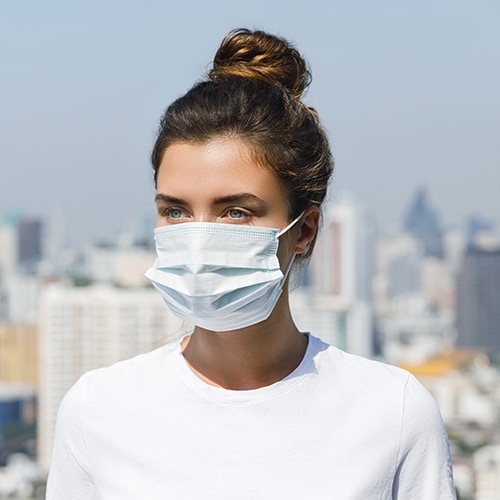Wearing a mask is not a new protocol for dental hygienists. However, while living in the Covid-19 pandemic the need to wear a mask has expanded beyond healthcare. It is now necessary for the general population to wear a mask and practice social distancing in public settings. Wearing a mask in public is important to help prevent transmission of SARS-CoV-2, the coronavirus that causes COVID-19.
'Mask mouth' is a new term coined during the COVID-19 pandemic. It is used in reference to the potential oral health side effects of wearing a mask for extended periods of time. Primarily this relates to the potential for halitosis, while dehydration can also result in dry mouth.
Wearing a mask for extended periods of time makes it especially difficult to stay hydrated which may lead to dehydration. Wearing a mask may also cause some individuals to breathe through their mouths resulting in a drying effect intra-orally. Dehydration also results in reduced salivary flow, which can contribute to halitosis, cause reduced clearance of food, debris and bacteria, and over time an increased risk of caries. Wearing a mask also encloses the odor making it more obvious and unpleasant.
If a patient complains of "mask mouth" or you notice changes in the patient's plaque level, malodor or other signs, you can engage the patient in dialogue about how often they wear a mask and what their current oral care routine consists of. The COVID-19 pandemic has also caused a lot of disruptions in daily routines, which may have lead to diminished self-care for some of our patients. Since wearing a mask is essential in public settings to help prevent SAR-CoV-2 transmission, how can we help patients?
To help sustain hydration, we can recommend that individuals remember to drink plenty of fluids at home, where you are not required to wear a mask, and to try to contain the length of time a mask is needed to allow for more regular fluid intake. It is important to encourage patients to maintain thorough oral hygiene regimens - or, in some cases, to encourage them to resume good oral health practices, or provide new recommendations that will motivate change.
Recommendations to improve patients home care routines may include:
Brushing twice-daily with an electric toothbrush with a smart App that tracks the frequency, duration, and coverage of patients brushing style and coaches patients on brushing, like the new Colgate hum.
Using an antimicrobial anti-plaque anti-gingivitis toothpaste such as Colgate Total.
Encouragement to floss or use a different method of interdental cleaning once daily.
For patients with increased plaque levels, an antimicrobial rinse such as Colgate Total Pro-Shield mouthwash can be recommended.
For patients with dry mouth, a hydrating mouth rinse can help, such as Hydris rinse which locks in hydration for up to 4 hours and relieves dry mouth. In situations where patients are at increased risk for caries, a high-level fluoride toothpaste like Colgate PreviDent 5000 Booster Plus can be prescribed.
Chewing sugar-free gum or xylitol gum can be recommended to help stimulate salivary flow to help wash away debris and acids and to clear fermentable carbohydrates before an acid attack can occur.
Since alcohol has a dehydrating effect, patients should also be advised to reduce their alcohol intake and to stop smoking or vaping.
It is important to properly discard or launder masks to prevent bacterial growth and the mask itself from smelling. The CDC recommends washing your mask at least daily and when it is soiled or damp, or throwing away your mask and replacing it. Laundering should occur as soon as possible so that they do not become moldy, and masks can be stored in a closed plastic bag until then. Patients may not be aware of the importance of discarding their mask daily, or the necessity to launder their cloth mask after each wear. If you notice the patients' mask is visibly soiled, damp/wet or appears to be overused compromising its efficacy, utilize your skills as a preventative care specialist to educate them on the importance of mask hygiene.
"Mask mouth" is a new problem since the pandemic, and i is important for dental hygienists to educate patients on prevention and treatment of "mask mouth".


Was this article helpful?
If you’d like a response, Contact Us.